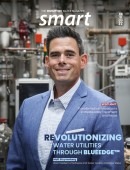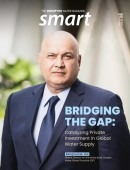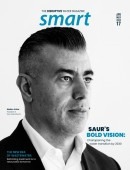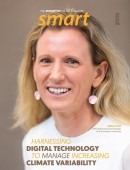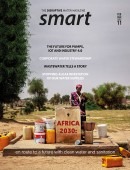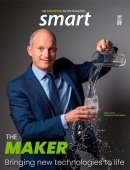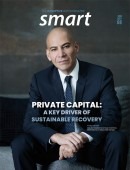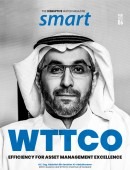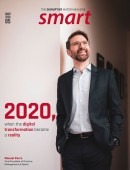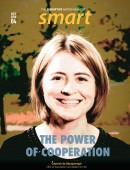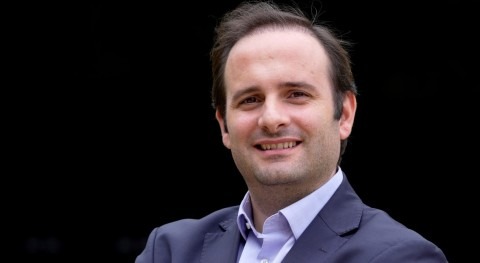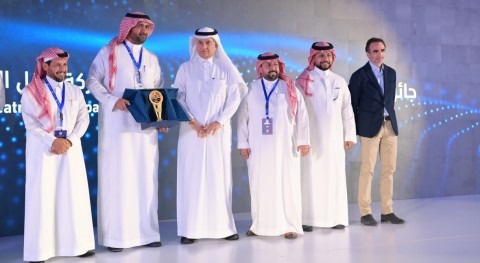Featured content
Content summary
We are pleased to announce the release of the November issue of Smart Water Magazine Print Edition, where we explore critical developments and innovative solutions shaping the global water sector. Our cover story examines the potential impact of Donald Trump’s second presidency on U.S. water policy, focusing on deregulation and a shift toward market-driven priorities.
This edition also features an in-depth look at the Saudi Water Partnership Company Forum 2024, a key event uniting industry leaders in Riyadh to advance water sustainability under Saudi Vision 2030. Building on the theme of innovation, we spotlight Bentley Systems, showcasing how AI and digital twins are revolutionizing water infrastructure. This feature is complemented by an exclusive interview with Gregg Herrin, Vice President of Water Infrastructure at Bentley Systems, who shares insights into how these technologies are driving smarter, more sustainable solutions.
Our coverage highlights World Toilet Day 2024, emphasizing the critical role of sanitation in improving global health and addressing systemic inequalities, and an interview with Jeanne-Astrid Ngako de Foki on the water policy of the African Development Bank, designed to enhance Africa’s water security.
In another highlight, Garry Tabor and Robert Wurm of Badger Meter discuss innovations in real-time monitoring that enhance water quality and operational efficiency. Other interviews with industry leaders offer diverse perspectives: Luis Beracoechea of Ingeteam discusses customer-focused solutions in water management; Javier Nieto, Business Development Director for Water at ACCIONA, shares insights on advancing sustainability and circular solutions; Stefano Vincenzo De Simone, Water Utilities Solution Area Manager at KISTERS, explores data validation and IoT for urban utilities; and Rodrigo Mello, Service Engineer at Saint-Gobain Canalização, discusses Filtralite’s filtration technologies.
This issue expands on sustainability and efficiency with a feature by WEG, highlighting innovations like high-efficiency motors and the WEGSEE+ tool that reduce costs and carbon footprints. In another compelling feature by ICEX, Spanish advancements in digital water management and leak detection technologies are poised to enhance global water efficiency.
Adding depth to the discussion on U.S. water policy, we feature interviews with Radhika Fox, Principal at North Star Strategy and former EPA Assistant Administrator, and Nancy J. Eslick, USAID Global Water Coordinator. Both leaders share insights on resilience, governance, and equity in water management.
Finally, this issue would not be complete without the insights of key experts in the sector. Alfonso González, Head of Contract and Risk Management at Agenda 21500; Jean-Martin Brault, Senior Water and Sanitation Specialist for the Latin America and Caribbean Region at the World Bank; Graham Hawke, Chief Scientist at TasWater; Gillian Blythe, CEO of Water New Zealand; and many others share their perspectives on the challenges and opportunities facing water management in the years to come.
This issue brings together cutting-edge technologies, visionary policies, and bold leadership shaping the future of water management worldwide. Join us as we delve into these pivotal stories and more in this must-read edition.
Features
A look at how Trump’s second presidency may impact U.S. water policy with deregulation and a shift to market-driven priorities.

The 2024 SWPC Forum will bring together industry leaders in Riyadh to advance water sustainability aligned with Saudi Vision 2030.

WEG leads with sustainable innovations like high-efficiency motors and the WEGSEE+ tool to reduce costs and carbon footprints.
Bentley Systems highlights the transformative role of AI and digital twins in shaping smarter, sustainable water infrastructure.

ICEX highlights Spanish innovations in digital water management and leak detection technologies, poised to enhance global water efficiency.
.jpg)
World Toilet Day 2024 emphasizes sanitation's role in public health and dignity, tackling global gaps in safe, resilient systems.

Interviews
Interview with Jeanne-Astrid Ngako de Foki, Manager Water Coordination and Partnerships Division, African Development Bank.
- The Bank promotes government and private investment in Africa through policy reforms and dialogue and provides technical assistance
- Issues like water affordability, scarcity and water quality concerns are impacting water systems and citizens all over the world
- The Bank Group’s objective is to contribute to the sustainable economic development and social progress of the African countries
- The Bank encourages NBS and climate-resilient infrastructure projects by leveraging smart, innovative and greener technologies
- The Bank advocates for national governments to deeply and periodically consult and inform all stakeholders at all stages of the project cycle
- The Bank engages at both national and local levels with all stakeholders including civil society, private sector and development partners
- Intelligent systems can significantly enhance operational efficiency in water management through various innovative approaches
- Currently, the main bottleneck for sound groundwater resource management in Africa is the existing lack of data on aquifers
- Most aquifers in Africa are transboundary, so to ensure groundwater resources are managed adequately, there needs to be transboundary cooperation
- Advanced data management platforms can integrate information from various sources to provide a holistic view of the water system
- The Bank’s Independent Recourse Mechanism (IRM) provides direct access to project-affected people so that they can raise concerns directly
- The Bank Group values feedback from stakeholders, such as local communities, seeking to learn from them to improve projects, raise standards
- The Bank Group’s Results Measurement Framework (RMF) for the period 2016-2025 is designed to measure and enhance development impact
- The continent is the soon-to-be world’s largest workforce and has the potential to transform into a strong global economic powerhouse
- Climate-related stresses are increasing in magnitude and intensity. As a result, existing infrastructure and water services are under strain
- My vision is that by 2050 all humans must be empowered to become actors in their future through first sustainable access to drinking water

Interview with Garry Tabor, Director-Smart Water Solutions and Robert Wurm, Director of Sales-Water Quality International at Badger Meter
- Smart digital sensor solutions placed in-network to monitor water quality provide the insights needed to ensure consistent quality
- We know little about the journey from the treatment plant to the tap: we need to pay closer attention to this critical part of the process
- Aging infrastructure is porous, with ingress of all sorts of things that affect the quality of the water being delivered to the tap
- Continuous monitoring for water safety involves standard parameters, but also event detection algorithms with so-called spectral alarms
- Monitoring water quality in the distribution network instantly feeds the information back to the water company so they can act on it
- Using and understanding water quality data can greatly improve the relationship and engagement between the consumer and water utility
- Utilities can save money on lab testing as online monitoring delivers measurement on demand, and software analyses data for proactive actions
- We use optical sensors and build algorithms to see contamination events as quickly as possible; sometimes within 10-20 seconds
- With our spectrometer probes we are “fingerprinting” the water and detecting if something has changed in the quality of the water
- Advanced event detection algorithms can be and should be adapted to every utility and every part of the drinking water supply
- Badger Meter has a unique water quality offering: the number of parameters we can measure in the network is unique in the industry
- Safe drinking water is a matter of public health and protecting the world’s most precious resource is at the heart of what we do at Badger Meter

Interview with Luis Beracoechea, Water Global After Sales Director, Ingeteam
- The INGEDRIVE family of low- and medium-voltage variable speed drives provides the water industry with key operational and technical benefits
- Clients increasingly prioritize equipment optimization, an opportunity for Ingeteam to introduce INGEDRIVE as a comprehensive solution
- Clients benefit from the expertise of our technical teams located around the world, providing support with impressive reach and responsiveness
- Ingeteam leverages over 85 years of expertise to deliver comprehensive, client-focused service across the entire product lifecycle
- Available in both mobile and web formats, INDARCARE facilitates all interactions between Ingeteam’s Water Division and its clients
- Our digital services, built on Digital Twins, intelligent algorithms, and IoT, enable condition-based maintenance and fault detection
- The water industry is evolving through electrification, decarbonization, digitalization, and globalization — trends Ingeteam fully embraces
- Ingeteam’s global presence, supported by local expertise and new service centers in the USA and Brazil, enables tailored, scalable solutions

Interview with Javier Nieto. Business Development Director for Water at ACCIONA
- We will continue to focus on technological innovation and sustainability, which is redefining how we tackle challenges in the sector
- We aim to strengthen our position as leaders in desalination, wastewater treatment, and water reuse projects
- Our objective is to keep expanding in regions where water management needs are critical, and we can add value
- Australia presents a great opportunity for our advanced solutions in desalination, wastewater treatment, and reuse
- The combination of population growth, urbanization, and climate vulnerability makes Southeast Asia very attractive for ACCIONA
- We seek not only commercial growth but also to contribute to improving the quality of life in the communities where we operate
- Emerging markets offer a great opportunity to make a positive impact and contribute to more sustainable water management
- We are working intensively with EWEC in Abu Dhabi to secure the Saadiyat Island desalination plant concession
- Recently, we obtained a concession to manage the wastewater network in the western Paraná region of Brazil
- At ACCIONA, we believe that water should not be a single-use resource but should be reused and maximized
- Technological innovation is key to driving the circular economy, and we will continue to develop solutions that optimize water use
- We believe that the PERTE projects will be transformative for the water sector in ways that may not initially seem related
- ACCIONA is continuously exploring new technologies for water management and improved efficiency of water treatment plants
- ACCIONA focuses not only on technology but also on positive social impact, enhancing the quality of life in the communities where it operates

Interview with Stefano Vincenzo De Simone. Water Utilities Solution Area Manager, KISTERS
- Urban water utilities must balance strict environmental regulations with the need for operational efficiency to remain profitable
- IoT devices enable real-time monitoring of water levels, flow rates, temperature, and pH, allowing quick responses to issues
- Data validation is a significant challenge for utilities, requiring time, expertise, and robust integration tools to avoid bad decisions
- Without proper data validation, utilities risk costly maintenance issues and compliance failures that threaten public health
- Effective data validation processes are key to operational excellence, ensuring reliable information drives decision-making
- The integration of AI into analytics will lead to collaborative data ecosystems, transforming water data management over the next decade
- When it comes to data aggregation, utilities often have similar needs to our environmental clients, but they also have unique requirements
- Ensuring that your data is accurate and reliable is essential for making informed decisions and achieving operational excellence

Interview with Rodrigo Mello, Service Engineer, Saint-Gobain Canalização
- Filtralite®, a filtration media made from expanded clay, has recently entered the Brazilian market through Saint-Gobain Canalização
- Filtralite is well adapted to reduce operation costs and improve production capacity and the efficiency of water treatment plants
- Brazil does not lack raw water resources, but the need for sanitation and drinking water is rising alongside the country’s urbanization
- Filtralite outperforms the combination of sand and anthracite solution, with better production capacity, and fewer backwashes needed
- Filtralite has been used for more than 25 years, with a strong reference list of more than 500 references in drinking water and wastewater
- We need time to be well known in a big country such as Brazil, but the market has an appetite for innovation and high-performance products
- When plant managers, plant designers, and even consultants look at our case studies around the world, they want to conduct a trial
- In the next steps of our development, we want all actors in the water market to be aware of Filtralite and mainly about its advantages

Interview with Nancy J. Eslick, USAID Global Water Coordinator and Senior Deputy Assistant to the Administrator, Bureau for Resilience, Environment and Food Security, USAID
- The U.S. Global Water Strategy recognizes that water security and sustainable sanitation are critical to building resilience
- Strengthening governance is essential for service delivery, effective water resources management, and a precondition to mobilizing finance
- The Agency’s approach includes regulatory improvements, supporting the creditworthiness of relevant authorities, and professionalization
- USAID supports the switch to solar energy, which reduces costs and avoids frequent service outages while increasing climate resilience
- Our work to strengthen water and sanitation products and services also aims to reduce inequalities among women and other marginalized groups
- USAID is committed to increasing collaboration with civil society, especially those led by and for marginalized groups
- Our investment includes a focus on communities that have never had access to basic services due to a range of local vulnerabilities
- To measure success, we use a comprehensive set of standard indicators while we innovate toward new metrics to capture the broader impact
- A locally led approach to water management includes recognizing the diverse governmental responsibilities and levels of decentralization
- The private sector plays a critical role in mobilizing commercial finance, delivering solutions at scale, and driving innovations
- The obstacles to a water-secure world mirror today’s global challenges: governance and financing gaps, climate change, and conflict
- We are maximizing taxpayer dollars by channelling our resources to the places and through the approaches that will produce the greatest impact

Interview with Radhika Fox, Principal, North Star Strategy & Former EPA Assistant Administrator
- The EPA’s WaterTA is investing $500 million to help underserved communities across America secure federal infrastructure funding
- I was proud to serve as co-chair of the PFAS Executive Council and to lead the development of the Agency’s PFAS Strategic Roadmap
- Effective water management will take all of us, from the federal government to the private sector to NGOs and philanthropies
- I see a really important chance to improve water access and quality in the United States, especially in underserved communities
- As extreme climate events increase, we’re going to see more crises in communities that have experienced a lack of infrastructure investment
- With so much ageing water infrastructure, we have a chance to build back better, being mindful of where we’re headed in the future
- Our priorities should be the digital transformation of the water sector and using advanced solutions for more efficient and durable water systems
- Climate change is a broad challenge that we need to approach in different ways, starting by making water infrastructure more resilient
- The effects of climate change on water impact all of us, and that’s why the entire water community needs to be involved in solutions
- Assistance is just one step on the path to water equity; we need to move our policy approach from water assistance to true water affordability
- The private sector’s ability to drive technological innovation, scale solutions, and collaborate with stakeholders makes it a powerful partner
- No administration has done more to address climate than the Biden-Harris Administration – especially in the context of water management

Opinion articles
Alfonso González, Head of Contract and Risk Management, Agenda 21500
Jean-Martin Brault, Senior Water and Sanitation Specialist, Latin America and Caribbean Region, World Bank
Ketan Kothari, Client Services Manager – Water at Expleo
Mariano Blanco Orozco, Member of the Executive Committee of EurEau – Global Director of Studies and Tenders, FCC Aqualia.
Pablo Infante, Head of Cox Water
Seth B. Darling, PhD. Argonne National Laboratory, Lemont, IL USA
Graham Hawke, Chief Scientist, TasWater
Gillian Blythe, Water New Zealand CEO






